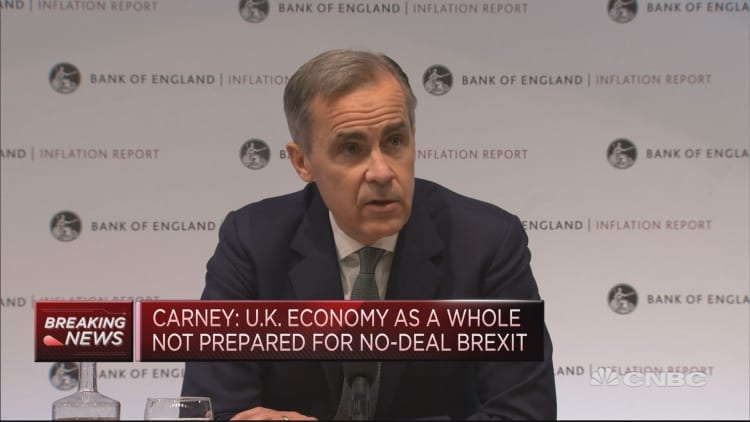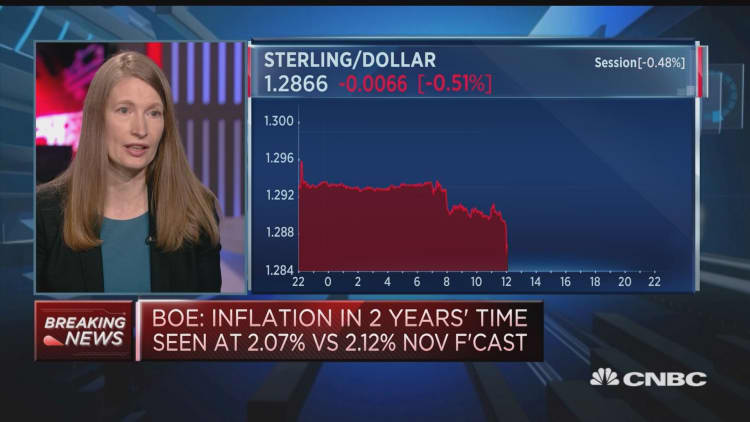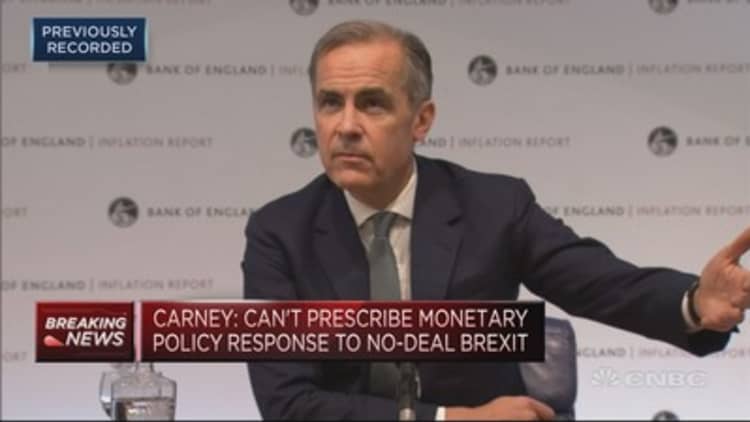
The Bank of England (BOE) warned on Thursday the U.K. is on track to register its weakest economic growth in a decade, blaming mounting Brexit uncertainty and a global slowdown.
With just 50 days to go before the country leaves the European Union, the BOE's nine-member Monetary Policy Committee (MPC), led by Mark Carney, unanimously voted to leave interest rates unchanged at 0.75 percent.
"U.K. economic growth slowed in late 2018 and appears to have weakened further in early 2019," policymakers at the central bank said.
"This slowdown mainly reflects softer activity abroad and the greater effects from Brexit uncertainties at home," they added.
Sterling fell 0.6 percent shortly after midday, before paring some its losses to trade at $1.2920 at 1:10 p.m. London time.
Economic growth
The BOE sharply downgraded its 2019 economic outlook to 1.2 percent on Thursday. As recently as November, the Bank had projected growth of 1.7 percent this year.
That revision marks the biggest cut of the its growth forecasts since the period immediately after the Brexit referendum in 2016. It also means policymakers at the central bank now expect Britain to grow at its slowest pace since the global financial crisis.
For 2020, overall economic growth is expected to slow to 1.5 percent, from 1.7 percent.
Further to this, BOE Governor Mark Carney said falling oil prices would likely push inflation below its target of 2 percent in the near-term, before bouncing back and settling "a little above" target in a year's time.
Elsewhere, the Federal Reserve has signaled to financial markets that its three-year run of interest rate hikes is coming to an end. Meanwhile, the European Central Bank (ECB) has acknowledged a slowdown in the euro zone and China is looking to stimulate its economy after registering its slowest pace of growth in three decades last year.
The Bank of England's interest rate decision and economic projections come as Prime Minister Theresa May meets with EU leaders in Brussels. She is looking to convince the bloc to consider making legally binding changes to the Brexit deal.
"The fog of Brexit is creating tension in financial markets," Mark Carney said during a press conference on Thursday.
"Now, how these tensions are reconciled once the fog lifts will have consequences for the path of monetary policy in ways that cannot be predicted in advance," he added.
The thorny subject of the Irish "backstop" — something of an insurance policy designed to prevent a hard border between the Republic of Ireland and Northern Ireland if there's no trade deal between the U.K. and EU — will be the main topic of debate.
May is seeking changes to the backstop arrangement within the Brexit deal (known formally as the "Withdrawal Agreement") because of widespread objection to it in the U.K. Parliament.
"There's an upside. If there's clarity on the deal sooner and we know the direction we're headed sooner and there's a smooth transition to that destination... we would expect the economy to pick up even more than in this forecast," Carney said.

Inflation risks
With a transition deal still not on the table, market participants are increasingly worried about the prospect of the world's fifth-largest economy abruptly leaving the bloc without a deal.
Should that happen, the BOE has said it would consider raising rates to offset a likely slump in the value of sterling.
However, most economists believe the Bank is more likely to cut rates to cushion a widely-expected blow to the economy.
"I think that the Bank does want to keep its options open and it does want to send a signal. Don't expect us to necessarily be cutting interest rates on a hard Brexit if the inflation risks are too strong," Jane Foley, head of FX strategy at Rabobank, told CNBC on Thursday.
The previous change in interest rates in the U.K. came in August last year, when the central bank raised rates by a quarter of a percentage point to their highest level since March 2009.
The U.K. is expected to leave the bloc at 11:00 p.m. London time on March 29.




